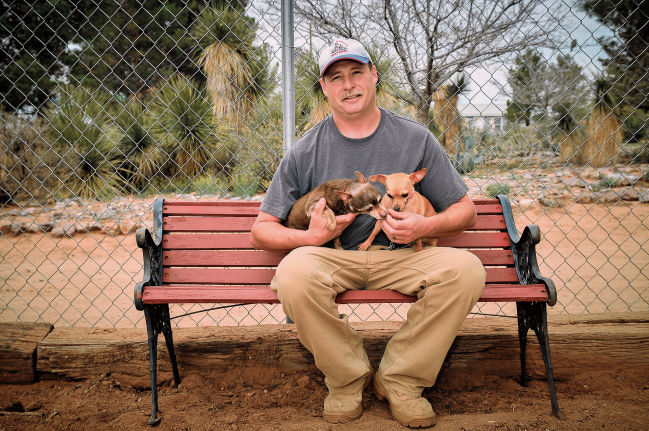Safe Haven Animal Sanctuary is a no-kill pet adoption center
- Alexia Severson
- Apr 15, 2015
- 4 min read

Safe Haven Animal Sanctuary Manager Jeff Barker sits on a bench at the sanctuary with Chihuahuas Chance and Gigi. (Photos by Jett Loe — Sun-News)
This story was originally printed in the Las Cruces Sun-News on April 3, 2015.
About a year and a half ago, Jeff Barker, the manager of Safe Haven Animal Sanctuary, located about 10 miles east of Las Cruces, spotted a chocolate brown Chihuahua running down the street while taking a cat to the vet. Those who saw the dog tried to coax him out of the street, but the little dog ended up getting hit by a passing car.
"I ran out and scooped him up and took him into the vet's office," Barker said.
After attending to the Chihuahua's injuries, it was learned that the dog had also been attacked by a larger dog that same week.
The car had only grazed him, but he had some damage from the dog attack, Barker said. After the vet treated the dog's injuries, Barker brought him back to the 3-acre property of Safe Haven Animal Sanctuary, where he was named Chance.
"He's fallen in love with a little Chihuahua named Gigi, so they're an item now," Barker said. "We're looking for a family that can take both these dogs in and give them a good home."
Along with Chance and Gigi, more than 40 dogs and about 35 cats also live at Safe Haven Animal Sanctuary, a primarily volunteer-based nonprofit organization, formed in 1995, that houses unwanted cats and dogs while they wait to be adopted by a loving family.
"We're the largest, longest established no-kill shelter in all of Doña Ana County and for a number of years, we were the only no-kill shelter," Safe Haven Executive Director Lorna Harris said.
Safe Haven can hold up to 50 dogs and 40 cats and provides the animals with plenty of space to roam around and enjoy life, Barker said.
"We pride ourselves on having larger kennels for the dogs," Barker said. "I have a couple small ones that are temporary kennels, but most of them are large, almost yard size because the dogs are going to be here for a bit."
The sanctuary also includes a cattery with an indoor and outdoor enclosure and isolation units used to keep animals temporarily contained due to medical or behavioral reasons.
"We have a very healthy population and we have strict intake guidelines, and isolation of all new incoming pets," Barker said. "We do take some strays, but we require the person keep the stray in their home for a period of time to make sure its healthy before bringing them out to us."
Barker said what makes Safe Haven unique is their attention to each animal.
"We know a lot of history about the animals, so we usually know where the animals come from, whether they have any medical conditions — plus, the whole time, we're here observing their behavior, working on issues and house training," he said.
Most of the pets that are brought into Safe Haven come from families who can no longer care for them because they are moving or because their health has made it difficult to care for the animal, Barker said.
But other pets brought to the sanctuary have a history of abuse or abandonment, Barker said, which is why Safe Haven stresses the need to find them a good home. This often requires a home visit and references for those looking to adopt a pet.
"We want to make sure they go to a forever home," he said of the animals the group considers family. "The animals live out their lives here if we can't find them a home."
And Safe Haven is always looking for volunteers, especially those interested in helping with organization's outside events, Barker said.
"We've got a lot of events planned this year and we'll need help staffing the tables and passing out flyers around town," he said.
Tricia Stutzman, 55, who has been an active volunteer for Safe Haven for the last couple months, said she enjoys helping out with organization events, getting outside with other volunteers and spreading the word about the sanctuary.
"We immediately have a common goal and we all work together in the cause for the paws," she said.
The organization also operates Safe Haven Thrift Store Boutique, located at 840-D El Paseo Road, where people can donate items they no longer use. All items sold at the thrift store go towards the operation of the sanctuary and the feeding of the animals, Harris said.
Safe Haven relies on monetary donations from the public and grants. Pet food donations or gift cards to pet stores are also needed, she said.
Typical adoption fees are $85 for dogs, $50 for adult cats and $75 for kittens six months or younger. However, during the month of March, all adoption fees are $20. All animals are spayed and neutered, vaccinated and microchipped, Barker said.
For information, visit shaspets.com or visit Safe Haven Animal Sanctuary on Facebook.
Alexia Severson may be reached at 575-541-5462.









Comments